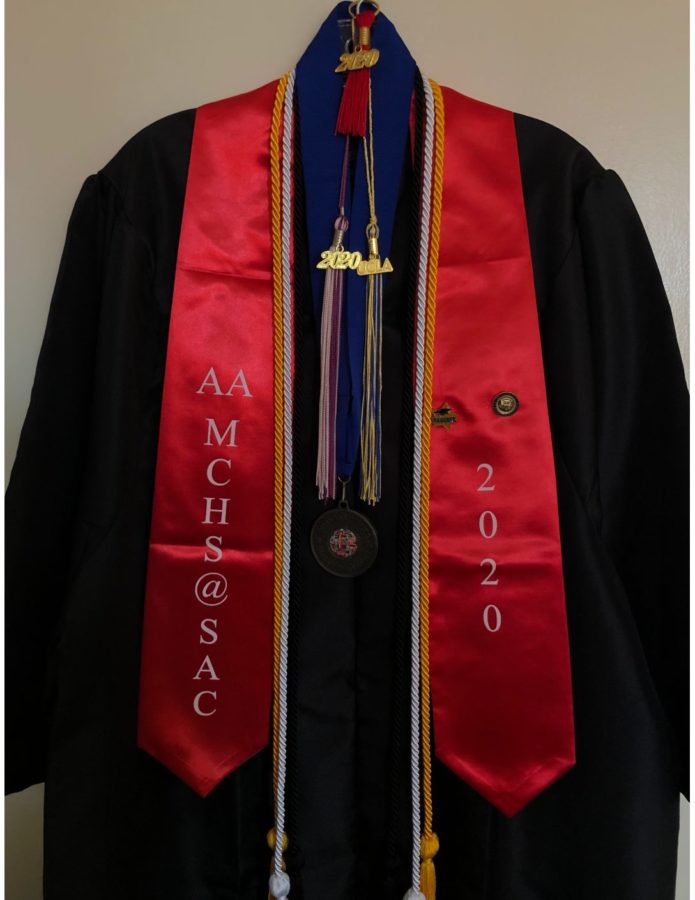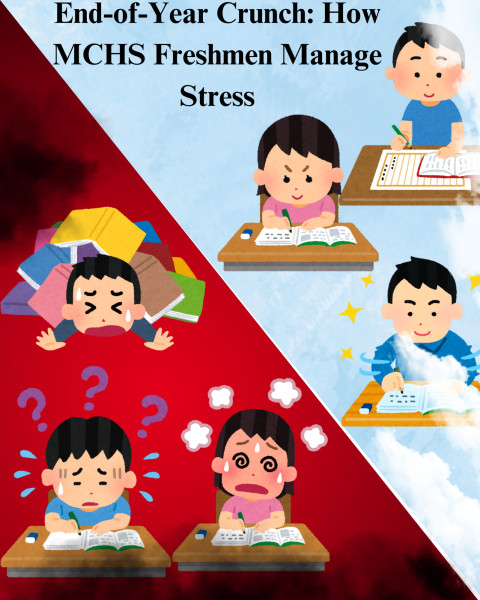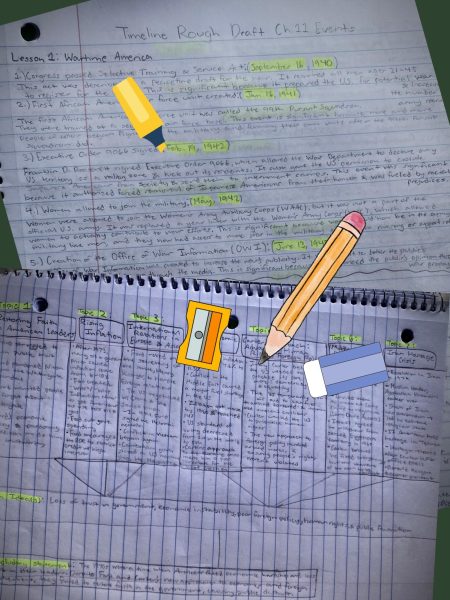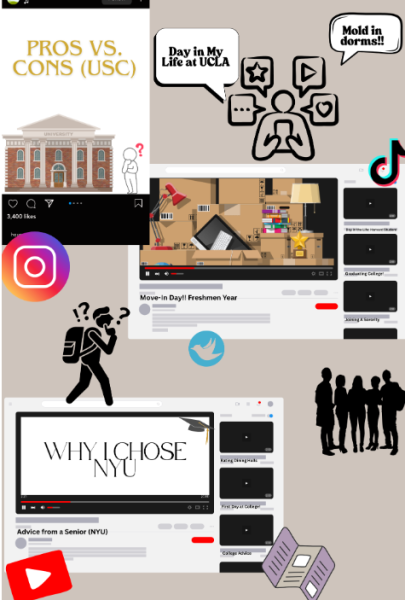First-generation and low-income students are breaking barriers
MCHS Alumni Daniela Flores is a first-gen and low-income student who graduated with numerous accomplishments, which are displayed through tassels, graduation cords, and more.
With millions of incoming freshmen attending a college or university later this fall, a large number identify as first-generation, low-income, or both. A person is considered a first-generation student if their parents did not complete a four-year college or university degree. Someone is considered low-income if their family has a relatively small income.
Focusing on the University of California, 41% of UC undergraduates are first-generation. 49% of UC’s first-generation students are African-American, Latino/Chicano, or American Indian. 60% of UC’s first-generation students are from lower-income households.
A higher education at a college or university is valuable to first-generation and low-income students because of the possibilities that can be achieved with a degree. Attaining a degree or multiple degrees can assist students with getting a high paying job in the future, making a difference in their community, and making their family proud.
Being the first in the family to attend a college or university can be an exciting experience, but it can also be accompanied by several obstacles. Experiencing self-doubt and lacking confidence in their abilities can set a student back from reaching their full potential. Being the first to go through the college experience can be a lot to handle, but taking advantage of school resources for first-gen students can be helpful. If a student is also low-income, paying for college can be difficult since their financial situation already presents a challenge. Tuition, room and board, textbooks, etc. are all additional costs that families might not be able to afford, even with financial aid assistance and loans. Although, all hope is not lost. Paying for college can be possible through numerous ways, such as applying for multiple scholarships, receiving grants, and working part or full time.
Most who identify as first-gen and low-income are also members of minority groups. Latino students made headlines last year when they made up the largest ethnic group of freshmen ever admitted to the University of California’s nine campuses.
An article by the Los Angeles Times stated, “Latinos slightly eclipsed Asian Americans for the first time, making up 36% of the 79,953 California students offered admission. Asians made up 35%, whites 21% and Black students 5%. The rest were American Indians, Pacific Islanders or those who declined to state their race or ethnicity. About 44% of admitted students were low-income while 45% were the first in their families to attend a four-year university.”
Middle College High School has a variety of educational opportunities for all students to take advantage of, the major one being dual-enrollment with Santa Ana College. Taking college courses beginning freshman year allows students to receive an AA Degree by the time they graduate high school. This achievement allows individuals to get a head start in their academics when transferring to a university. AVID, College Bound, the SAC Honors Program, etc. are resources available for students to get ahead and receive the support necessary to succeed in high school and beyond. MCHS has helped many first-gen and low-income students succeed, with the guidance of teachers, SAC professors, and counselors.
MCHS senior Adrian Garcia is the oldest of three brothers who will be the first in his family to attend a university. His mother is a single parent, so she has to provide for a family of four. A college education is valuable to him because of the opportunities a degree can bring, such as a good-paying career. Although, he still faces an immense amount of pressure from his family members, who are hoping to see him achieve what they could not.
Garcia said, “As first-gen students we have this pressure, where people always say ‘you’ll be the first one to get into college and you’ll be the first one to actually be something,’ and it’s this constant reminder that you just have to push yourself all the time. You want to be successful, and you have your whole family pushing you. It’s not pressure in a bad way, but it’s pressure to be a better person.”
Although Garcia will not be graduating with an AA degree from SAC, he will still have several college credits. These can assist him with having a head start at his chosen university. There are obstacles Garcia has had to face along the way, but they have further motivated him to not give up.
Garcia stated, “When this pandemic hit, it made it difficult for me to stay focused in school because I lost people that were close to me. By losing those people, I lost all motivation. Yes, I did fall behind, but I still had a whole journey ahead of me and that has helped me realize that a small bump on the road wasn’t going to stop me.”
Garcia plans to major in psychology at a UC later this Fall. This will allow him to fulfill his educational goals and pursue a career where he can assist others.
He said, “I hope to look for internships and see what it’s like to be a therapist. I want to be a therapist for drug addicts. I have had family members who struggled with drug addiction and alcoholism, so I want to work in that field. I plan to obtain either my Masters or PhD in psychology in the future.”
Garcia has some helpful recommendations for all freshmen, sophomores, and juniors who are also first-gen and low-income.
He stated, “My first piece of advice is to not overwork yourself, I know it can be stressful being the first one going to college and having your whole family put this pressure on you. If you fall behind like I did, do not let it get to you. One small mistake isn’t going to affect your whole future, and I learned that the hard way. I would constantly put myself down for small mistakes. Also, take advantage of any opportunities that you get. Although they might seem like extra work, they’re not. It’s a chance to help you succeed in your life, so I definitely recommend you take part in any kind of program or complete any scholarships available.”
MCHS Alumnus Daniela Flores is currently a first-year at the University of California Los Angeles. She is the oldest of two sisters and the first in the family to attend a university. Her parents are immigrants from Mexico. Flores is also low-income because her father is the provider of the household, taking care of a family of five.
She said, “My main motivation to pursue a degree at UCLA is to get a good career where I can make enough money for myself and my family. My dad is always working long hours and doing the most for us, so I want to have a good career where I don’t have to go through that. I want to live comfortably and give back to my parents in the future.”
Flores graduated with four AA Degrees and was a part of the Honors Transfer Program at SAC. She is currently taking upper-division courses in psychology, which are classes that are focused on her major. A majority of freshmen are currently taking their General Education courses, but she already completed her General Ed. requirements at SAC. This is the head start students hear so much about at MCHS.
She stated, “Being able to take college classes at MCHS was a huge opportunity. I already had a career in mind that I wanted to pursue, so I was able to take classes that helped me explore and know more about what I want to do. College classes helped me prepare for what was expected of me at a university.”
Compared to a 16-week semester at SAC, UCLA has a quarter system. This means that there are four 10-week sessions throughout the year. She is currently in her third quarter.
Flores said, “The quarter system is harder since it’s less time. In your second week you’re already having the first exam or a paper to do. At week four you’ll have midterms already. Before you know it, it’s finals week. It’s very fast paced so it gets stressful because of the time, but overall I do prefer it over a semester system. This is because I get more classes done in the year.”
Flores is a psychology major at UCLA, but is considering double majoring in education. She plans on obtaining a Bachelor’s in psychology and education, then attending graduate school at UCLA to get her PhD.
She said, “Right now I’m not really sure what I want to do yet. I’m considering becoming a teacher, I’m hoping to be in a position where I can help students plan their future and learn how to have a positive view on the world.”
In the beginning, Flores felt that she did not belong at UCLA and that her success was not deserved. She was experiencing imposter syndrome.
According to Merriam-Webster, imposter syndrome is defined as, “A psychological condition that is characterized by persistent doubt concerning one’s abilities or accomplishments accompanied by the fear of being exposed as a fraud despite evidence of one’s ongoing success.”
Flores said, “UCLA is this very prestigious university, so saying that and being enrolled made me feel like I shouldn’t be here. As if I don’t belong there, but I was accepted and I know I worked for it. I have gotten all A’s and B’s so far in my classes. At first I did experience a lot of imposter syndrome because it’s this prestigious school and I felt like I shouldn’t be there because of where I come from. But over time, as I have taken more classes and made new friends, I don’t feel as left out anymore.”
Flores has a few words of advice for all MCHS seniors who will be transitioning from high school to college very soon, whether they are first-gen and/or low-income or not.
She said, “Your education is for you, so you should be the one benefiting from it by doing what you want to do. It’s your life. For me, I have heard people say that psychology isn’t something you should major in because they believe it’s a dumb major and a fake science. I’ve heard it all, but psychology is what I want to do.”






































